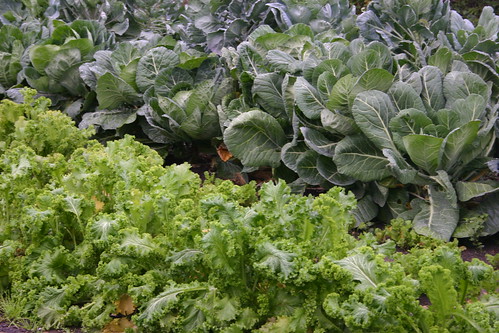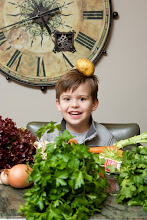quit playin' cards and shootin' dice
He's in the jailhouse now”
Soggy Bottom Boys

A few weeks ago when I told my little locavore that I was going to jail, he looked a little alarmed. A common shriek of his when angry is “you’re going to jail.” We’re not sure where he picked that one, but news of my visit seemed to induce some guilt. Seeing this, I reassured him that I would be home in time to pick him up from school. My visit was simply a field trip to see one of the most interesting projects of Chicago urban agriculture.

On a rainy Friday afternoon, I travelled down to the south side to the Cook County jail near 30th and California with my friend Nina Winston of the Downtown Farmstand. Nina had arranged for us to meet with David Devane, Executive Director of the Department of Community Supervision and Intervention and to see the garden project that he initiated at the jail.
Built on the site of the Contagious Diseases Hospital, the jail holds non-violent, non gang offenders, mostly on drug and alcohol related charges. As Devane said, these are the “crème de la crud” of the criminal justice system.
Inspired by a similar project in San Francisco, Devane began the garden project in 1993. 16 years later, the garden has blossomed to 13,000 square feet, producing about 3 thousand pounds of produce. Each year, a group of detainees are selected to participate in the garden program. After completing it, they earn a Master Gardener certificate from the University of Illinois. Devane noted that the jail has tracked recidivism and has concluded that those graduating the program have experienced it a far lower rate. According to garden manager Mike Taff, as reported by Mr. Brown Thumb on Chicago Now, the rate of recidivism for those graduating the program is 17% far below the 56% national average.
The garden grows a number of crops, including peppers, collard greens, okra, corn, giant pumpkins, and even peanuts. Currently, all the produce grown in the garden is donated to homeless shelters. The sad reality tragedy of the garden is that the only inmates who can eat from the garden are those who work in it. Due to very strict federal and state regulations about what you can feed the inmates, none of the produce grown in the garden can be used in the meals prepared for the jail’s residents.

Greens

A great pumpkin

Peanuts
Currently, the garden graduates one “class” a year, celebrating this achievement with a harvest celebration (this year’s was documented by Mr. Brown Thumb). The garden, however, recently acquired a brand new greenhouse so Devane hopes that the garden’s ability to extend the growing season will allow it to graduate two additional classes. He also hopes that the program can become self-sustaining, selling to restaurants, independent grocers and farmers’ markets. This season, Charlie Trotter's restaurant purchased 225 pounds of produce from the garden. Devane implied that another high profile chef had expressed an interest. Devane is actively seeking new sources to sell the garden’s bounty, which afforded Nina and me the opportunity to visit and brainstorm about new outlets and sources of funding. Devane noted that while he has not yet been asked to grow a specific product by restaurants who’ve contacted, he would be happy to consider it.

I returned north encouraged and more than a little muddy to pick up my little locavore quite happy to find his mom wasn’t still in the pokey.
Posted as part of Fight Back Fridays.







Great post on a great program, Melissa. What a shame that more inmates can't enjoy the produce! Do you know if anyone is trying to get approval for more exceptions?
ReplyDeleteIt's something that my friend Nina wants to look into. It seems to be a terrible waste. I'll let you know what we find out.
ReplyDeleteThe non-violent offenders in our city jail get to participate in a similar program. Their garden is wonderful! We drive out by it often and I love to stop and check it out (of course, the inmates aren't there, it's offsite of the jail and supervised by police when they are).
ReplyDeleteThe prisoners here do get to eat the produce they grow. They grow so much to supplement the food served in the jail.
Mother hen,
ReplyDeleteWhere are you located? I would love to know why there's a difference as David had said that it was a matter of federal regulations. Very interesting.
I'm thinking of approaching the county jail about a program like this. Do you have any remarks on how they determine who will work in the garden? "Good behaviour" perhaps?
ReplyDeleteRebekah,
ReplyDeleteI hadn't asked that question. Devane did say that all of the participants are non-violent offenders, but "good behavior" would be a good indicator I would think.